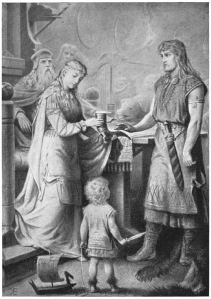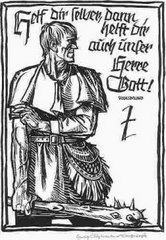 Today’s reading is from Hebrews chapter 12:
Today’s reading is from Hebrews chapter 12:
7If ye endure chastening, God dealeth with you as with sons; for what son is he whom the father chasteneth not? 8But if ye be without chastisement, whereof all are partakers, then are ye bastards, and not sons.
9Furthermore we have had fathers of our flesh which corrected us, and we gave them reverence: shall we not much rather be in subjection unto the Father of spirits, and live?
In verse 8 the word translated as ‘bastards’ is the Greek, nothos (Lampe’s Patristic Greek Lexicon agrees with the Liddell & Scott Lexicon as they define it, “baseborn, adulterated, cross-bred”).
In the Old Latin Text A this word is rendered nothus (which the Lewis and Short Latin Dictionary and Leverett’s Latin Dictionary define as, “of mixed-breed, a mongrel”).
The Old Latin Text J renders it as adulterinus (this, the Oxford Latin Dictionary defines as “Not thorough-bred, not full-blooded”).
And Old Latin Texts I and D use the term adulter (Oxford Latin Dictionary defines this as, “mixed, cross-bred”).
So it is that Thomas Holyoke’s Large Dictionary says that the Greek nothos and the Latin nothus are synonyms with the Hebrew word Mamzir and the Greek word moichikos. All of these words mean “mongrel”.
Luther therefore, being well aware of this, translated the word nothos in Hebrews 12:8 with the German word, bastarde and according to the English-Deutches, Deutsch-Englisches Worterbuch (1956), bastarde denotes “mongrels”.
Of course, as our modern English texts have conspicuously replaced the politically incorrect terms mongrel and bastard with the word illegitimate, the modern Luther bible has likewise replaced bastarde with the denatured term, Ausgestobene, meaning, “outcasts”.
Beyond the lexical matter however is the contextual reality that verse 9 appeals to an a fortiori argument from “fathers of our flesh” to the “Father of spirits”. The author, arguing from lesser to greater, is substantiating the good of the lesser category, even if it is subservient to the greater category.
And the employ of such an argument is an obvious reference to and endorsement of the case Law of Deuteronomy 23:2. Far from nullifying or abrogating the prohibition against Bastards (mamzer/nothos/nothus/mischling/bastarde), the author calls upon it to justify his broader argument for purity in matters spiritual.
In short, the author of Hebrews presupposes the continuity of the national prohibition on bastards (mongrels) into the New Testament age as well as the reader’s responsibility to assume the same.
And Paul presupposes the same principle in II Corinthians chapter 2:
17For we are not as many, which corrupt [literally, adulterate] the word of God: but as of sincerity [literally, purely generated], but as of God, in the sight of God speak we in Christ.
… and in II Corinthians chapter 6:
14Be ye not unequally yoked together with unbelievers: for what fellowship hath righteousness with unrighteousness? and what communion hath light with darkness?
And when one employs an a fortiori argument saying, “if A, how much more so B(?)”, this requires the reader to assume the validity of A first. Without that assumption, the a fortiori argument cannot work.
Which is to say that the New Testament Christians presupposed the continuing equity of the Old Testament Laws contra unequal yoking, ethnic adulteration, and racial mongrels.
And the author of Hebrews again undergirds this point as he continues (Heb.12):
14Follow peace with all men, and holiness [literally, separateness], without which no man shall see the Lord:15Looking diligently lest any man fail of the grace of God; lest any root of bitterness springing up trouble you, and thereby many be defiled [literally, made impure]; 16Lest there be any fornicator[literally, sexually immoral] , or profane person, as Esau, who for one morsel of meat sold his birthright.
For what cause is Esau called a profane fornicator? Genesis 26 yields the answer:
34And Esau was forty years old when he took to wife Judith the daughter of Beeri the Hittite, and Bashemath the daughter of Elon the Hittite:
35Which were a grief of mind unto Isaac and to Rebekah.
Of this, the footnote commentary of the Reformation Study Bible reads:
The story of the stolen blessing is framed by Esau’s marriage to Hittite women, and his parents’ resulting displeasure (27:46). Profane Esau showed his disregard for the covenant blessings by marrying daughters of the land …
So then, when we look back to the words of the author of Hebrews on the matter, it is clear that the entirety of the writer’s argument rests upon the assumption of the abiding equity and righteousness of the Old Testament prohibitions contra Miscegenation.
Hat-tip: the Lexical work of John Herrell was especially helpful to me in this study.
Read Full Post »
 The Visigoth, though Barbarians, refused to harm any Christian or Christian churches in the sacking of Rome, yet America needlessly blew up untold numbers of our Christian kinsmen in two world wars along with the two Christian centers of Japan, all of the Christian churches in Iraq, and we aided Muslims in their slaughter of the Serbian defenders.
The Visigoth, though Barbarians, refused to harm any Christian or Christian churches in the sacking of Rome, yet America needlessly blew up untold numbers of our Christian kinsmen in two world wars along with the two Christian centers of Japan, all of the Christian churches in Iraq, and we aided Muslims in their slaughter of the Serbian defenders.


 "And the children of Israel did according to all that the LORD commanded Moses: so they pitched by their standards, and so they set forward, every one after their families, according to the house of their fathers." (Num.2:34)
"And the children of Israel did according to all that the LORD commanded Moses: so they pitched by their standards, and so they set forward, every one after their families, according to the house of their fathers." (Num.2:34)
 Though he cling to the Altar, the Apostate will find no refuge from God's Law.
Though he cling to the Altar, the Apostate will find no refuge from God's Law.
